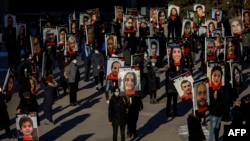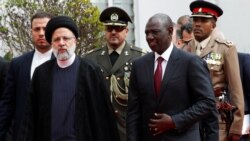A group of families who lost relatives when Iran shot down a Ukrainian passenger plane in 2020 tells VOA the four nations that initiated international legal action in the case this month have not supported their request for a separate global probe.
In September, the Association of Families of Flight PS752 Victims asked the International Criminal Court prosecutor’s office to expand its investigation of alleged war crimes in Ukraine to include the Iranian missile strike that downed the Ukraine International Airlines plane as it took off from Tehran on January 8, 2020.
The strike killed all 176 people on board, most of them Iranians and Iranian Canadians who were flying to Canada via Kyiv. Iran says its forces mistook the plane for a U.S. missile.
The Hague-based ICC is a permanent international court, governed by a treaty called the Rome Statute, that investigates and tries individuals accused of genocide, war crimes, crimes against humanity and the crime of aggression.
Ukraine, which is not a state party to the Rome Statute, has accepted ICC jurisdiction over alleged crimes committed on its territory since November 2013.
Tokyo Convention cited
In its September 14, 2022, request to the ICC prosecutor, the families’ association contended the ICC has jurisdiction because the plane was registered to Ukraine. Under the 1963 Tokyo Convention, ratified by 187 nations including Iran and Ukraine, an aircraft’s state of registration has jurisdiction over acts committed on board.
On July 4, Canada, Britain, Sweden and Ukraine, four nations that lost citizens in the Flight PS752 incident, asked the International Court of Justice, also based in The Hague, to start proceedings against Iran. The ICJ is the main judicial organ of the United Nations, responsible for settling legal disputes between states.
The four countries alleged breaches of international legal obligations by Tehran in relation to the downing. They asserted that Iran “failed to take all practicable measures” to prevent the destruction of Flight PS752 by its armed forces and that it “failed to advance a full, transparent and impartial criminal investigation and prosecution in accordance with international standards.”
Iran’s foreign ministry rejected those accusations in a July 9 statement and accused the four nations of acting in pursuit of “political objectives.” It said that Tehran acted “in accordance with domestic laws and international commitments” by offering cooperation to the four nations, offering compensation to victims’ families and prosecuting unidentified members of its armed forces.
Three of the four states that filed the ICJ application, Canada, Britain and Sweden, are among the 123 states that are parties to the Rome Statute of the ICC.
Asked by VOA why Canada has not made any public expression of support for the families’ association request to the ICC prosecutor to investigate the incident, the Canadian foreign ministry emailed links to Ottawa’s past ICJ-related statements that did not mention the ICC. Pressed for a specific comment on the ICC request, the foreign ministry said it had nothing further to add.
The British and Swedish embassies in Washington and the Ukrainian foreign ministry also did not provide a comment in response to VOA questions about the ICC request.
Strength of case
University of Ottawa law professor Errol Mendes told VOA in a text message that some members of the Canadian government have been reluctant to join the families’ association ICC submission, doubting it is strong enough to meet ICC requirements for initiating an investigation.
Mendes, who was a visiting lawyer at the ICC in 2015, said some Canadian officials point to the ICC’s role as a court of last resort, which intervenes only when national courts are unwilling or unable to prosecute the gravest of crimes.
Under ICC rules, its prosecutor’s office can start an investigation on its own initiative or upon request from a state party.
VOA asked the ICC prosecutor’s office for an update on the request by the families’ association. In its emailed reply, the office noted that Iran is not a state party to the Rome Statute and offered to look into the matter. But five days later, at the time of publication of this report, no further comment was received.
In announcing its request last year, the families’ association said the ICC prosecutor’s office “clarified that [it has jurisdiction over] situations in which an attack is launched from a non-state party onto the territory of a state with jurisdiction before the ICC.”
The association’s spokesman, Kourosh Doustshenas, discussed the status of the ICC request on the July 19 edition of VOA’s Flashpoint Iran podcast.
The following transcript of Doustshenas’ July 12 interview has been edited for brevity and clarity.
VOA: What are the latest developments in the association’s ICC request?
Kourosh Doustshenas, Association of Families of Flight PS752 Victims: Since we submitted our case to them on September 14, we are in a holding pattern. We have requested that all countries that are signatories to the Rome Statute support the PS752 families’ association legal submission. To this day, unfortunately, we have not received any support from any country. We really were hoping that those countries would be interested to see an end to [alleged] terrorist acts [such as the downing of Flight PS752] and that they would come forward to support our ICC case.
VOA: Given that you have four countries that just submitted an application to the ICJ in relation to Flight PS752, why wouldn't any of them also support your ICC case?
Doustshenas: That is a very good question. In fact, we have been trying to find out for ourselves why some of these countries are reluctant to support this case at the ICC, because at the end of the day, there is an open ICC investigation into [alleged] war crimes that covers the territory of Ukraine. Flight PS752’s plane was registered in Ukraine, and as such, it is considered under international law as a part of Ukraine’s territory. So, if the ICC is doing all kinds of investigation for war crimes [involving Ukraine], why not also look into this and at least do an investigation?
VOA: What do you think is going to happen next with your ICC request?
Doustshenas: We will continue asking our lawyers to bring it to the attention of the ICC prosecutor office and to ask if it needs any support from the families’ association or from anywhere else. We are ready to help.
We understand that [the ICC prosecutors] are overwhelmed with all kinds of investigations that they are currently undertaking, namely investigations of atrocities in Ukraine and everywhere else. But we do not want our case to be forgotten. We want to make sure it will be considered, too.
This is an obligation not only for the ICC, but for all the countries that are signatories to the ICC to also put their effort into bringing this case forward and having it prosecuted after [the prosecutor office does] the proper [preliminary examination and] investigation. The shootdown of Flight PS752 has not been properly investigated [so far] and an investigation needs to be done first.
We are aware that there is a criminal investigation happening in Ukraine. It has been going on for more than two years. Unfortunately, when it was really taking many steps forward in March 2022, the [full-scale] Russian invasion [of Ukraine] slowed down that process. So, there is an active investigation, but it does not have enough resources to allow it to go forward.












